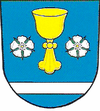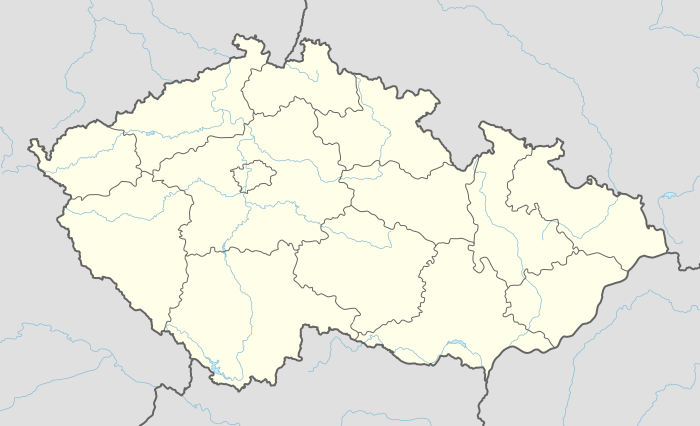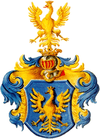Třanovice
![]()
![]()
Třanovice Trzanowice | |
|---|---|
Village | |
Saint Bartholomew Church | |
 Flag  Coat of arms | |
 Location in the Czech Republic | |
| Coordinates: 49°42′24″N 18°31′42″E | |
| Country | Czech Republic |
| Region | Moravian-Silesian |
| District | Frýdek-Místek |
| First mentioned | 1440 |
| Government | |
| • Mayor | Jiří Tomiczek |
| Area | |
| • Total | 8.6 km2 (3.3 sq mi) |
| Elevation | 320 m (1,050 ft) |
| Population (2019)[1] | |
| • Total | 1,033 |
| • Density | 120/km2 (310/sq mi) |
| Postal code | 739 53 |
| Website | www |
Etymology
The name is patronymic in origin derived from personal name Trzenek. The name evolved from Trzenkowicze (1431, 1450) through Trzankowicze (1523, 1578), Strzankowicze (1571) into Trzanowicze beginning from 1610 (na Trzanowiczych), also the division to Upper (Horní/Górne/Ober) and Lower part (Dolní/Dolne/Nieder) of the village began in the 16th and 17th centuries.[3]
History
The village was first mentioned in a written document in 1431 as Trzenkowicz[e].[3][4] Politically it belonged then to the Duchy of Teschen, a fee of the Kingdom of Bohemia, which after 1526 became part of the Habsburg Monarchy.
The village became a seat of a Catholic parish probably prior to 16th century. After the 1540s Protestant Reformation prevailed in the Duchy of Teschen and a local Catholic church was taken over by Lutherans. It was taken from them (as one from around fifty buildings in the region) by a special commission and given back to the Roman Catholic Church on 24 March 1654.[5]
After Revolutions of 1848 in the Austrian Empire a modern municipal division was introduced in the re-established Austrian Silesia. The village as a municipality was subscribed to the political and legal district of Cieszyn. According to the censuses conducted in 1880, 1890, 1900 and 1910 the population of the municipality dropped from 902 in 1880 to 875 in 1910 with a majority being native Polish-speakers (between 95.8% and 97.9%) accompanied by a small German-speaking minority (at most 38 or 4.2% in 1880) and Czech-speaking (at most 12 or 1.4% in 1910). In terms of religion in 1910 the majority were Protestants (53.9%), followed by Roman Catholics (45.2%), Jews (6 people) and 2 people adhering to another faiths.[6] The village was also traditionally inhabited by Cieszyn Vlachs, speaking Cieszyn Silesian dialect.
After World War I, fall of Austria-Hungary, Polish–Czechoslovak War and the division of Cieszyn Silesia in 1920, it became a part of Czechoslovakia. Following the Munich Agreement, in October 1938 together with the Zaolzie region it was annexed by Poland, administratively adjoined to Cieszyn County of Silesian Voivodeship.[7] It was then annexed by Nazi Germany at the beginning of World War II. After the war it was restored to Czechoslovakia.
 Lutheran church built by Tadeusz Michejda
Lutheran church built by Tadeusz Michejda Municipal office
Municipal office- Museum of Georgius Tranoscius
Footnotes
- "Population of municipalities of the Czech Republic". Czech Statistical Office. 1 January 2019.
- "2001 census data". Czech Statistical Office.
- Mrózek, Robert (1984). Nazwy miejscowe dawnego Śląska Cieszyńskiego [Local names of former Cieszyn Silesia] (in Polish). Katowice: Uniwersytet Śląski w Katowicach. p. 176. ISSN 0208-6336.
- Panic, Idzi (2010). Śląsk Cieszyński w średniowieczu (do 1528) [Cieszyn Silesia in the Middle Ages (until 1528)] (in Polish). Cieszyn: Starostwo Powiatowe w Cieszynie. p. 307. ISBN 978-83-926929-3-5.
- Broda, Jan (1992). "Materiały do dziejów Kościoła ewangelickiego w Księstwie Cieszyńskim i Państwie Pszczyńskim w XVI i XVII wieku". Z historii Kościoła ewangelickiego na Śląsku Cieszyńskim (in Polish). Katowice: Dom Wydawniczy i Księgarski „Didache“. pp. 259–260. ISBN 83-85572-00-7.
- Piątkowski, Kazimierz (1918). Stosunki narodowościowe w Księstwie Cieszyńskiem (in Polish). Cieszyn: Macierz Szkolna Księstwa Cieszyńskiego. pp. 265, 284.
- "Ustawa z dnia 27 października 1938 r. o podziale administracyjnym i tymczasowej organizacji administracji na obszarze Ziem Odzyskanych Śląska Cieszyńskiego". Dziennik Ustaw Śląskich (in Polish). Katowice. nr 18/1938, poz. 35. 31 October 1938. Retrieved 1 July 2014.
References
- Londzin, Józef (1932). Kościoły drewniane na Śląsku Cieszyńskim. Cieszyn: Dziedzictwo błog. Jana Sarkandra. pp. 374–378. OCLC 297540848.
External links
| Wikimedia Commons has media related to Třanovice. |
- (in Czech) Official website
- (in Czech) Třanovice congregation of SCEAV

